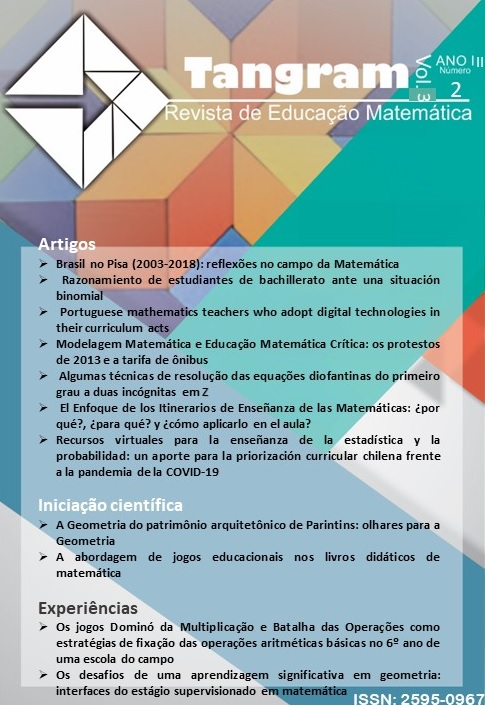The educational games approach on mathematics textbooks
DOI:
https://doi.org/10.30612/tangram.v3i2.10814Keywords:
Educational games. Middle School. National Plan of the Textbook.Abstract
This article presents an investigation into how the Middle School Mathematics textbooks approved by the 2017 National Textbook Program (PNLD) present and prescribe the use of the didactic games. Methodologically the research has a qualitative nature, which analyzed the content of five of the eleven PNLD collections considering the following categories: Application Games, Curiosities, Didactic Material and Problem-Situation. For this work we selected the Application Games and Curiosities, categorized into strategy, knowledge, pre-instructional, coinstructional and post-instructional games. In the evaluated material, the application games prevail most of the time, inserted at the end of the textbook section as a way of deepening the content under study.Downloads
References
Bardin, L. (2011) Análise de conteúdo. São Paulo: Edições 70.
Brasil. (2017) Decreto nº 9.099, de 18 de julho de 2017. Dispõe sobre o Programa Nacional do Livro e do Material Didático. Diário Oficial da União: Seção 1, Brasília, DF, p.7 – 19 jul. 2017.
Barroso, J. M. (2006) Projeto Araribá; v.6. 1ª ed. São Paulo: Editora Moderna.
Campos, M. F. T. S. (2009) Jogos e Materiais Concretos em Livros Didáticos de Matemática das Séries Iniciais do Ensino Fundamental. 2009. 212 f. Dissertação (Mestrado em Educação) – Universidade Federal de Minas Gerais, Faculdade de Educação, Belo Horizonte.
Dante, L. R. (2016) Projeto Teláris: Matemática; v.8. 2º ed. São Paulo: Editora Ática.
Elorza, N. S. L. (2013) O uso de jogos no ensino e aprendizagem de matemática nos anos iniciais do ensino fundamental: levantamento de teses e dissertações. 2013. 343 f. Dissertação (Mestrado em Educação) – Universidade Estadual Paulista, Presidente Prudente.
Grando, R. C. (2000) O conhecimento matemático e o uso de jogos na sala de aula. 224 f. Tese (Doutorado) - Universidade Estadual de Campinas, Faculdade de Educação, Campinas, 2000.
Grando, R. C. (1995) O Jogo suas Possibilidades Metodológicas no Processo EnsinoAprendizagem da Matemática. 175 f. Dissertação (Mestrado em Educação) – Universidade Estadual de Campinas, Faculdade de Educação, Campinas.
Mazzieiro, A. S; Machado, P. A. F. (2015) Descobrindo e aplicando a matemática; v.6. 2ª ed. Belo Horizonte: Editora Dimensão.
Onaga, D. S.; Mori, I. (2015) Ideias e desafios; v.6. 18ª ed. São Paulo: Editora Saraiva.
Souza, J.; Pataro, P. M. (2015) Vontade de Saber; v. 6. 3ª ed. São Paulo: Editora FTD.
Downloads
Published
How to Cite
Issue
Section
License
Authors must accept the publication rules when submitting the journal, as well as agree to the following terms:
(a) The Editorial Board reserves the right to make changes to the Portuguese language in the originals to maintain the cultured standard of the language, while respecting the style of the authors.
(b) Authors retain the copyright and grant the journal the right to first publication, with the work simultaneously licensed under the Attribution-NonCommercial-ShareAlike 3.0 Brazil (CC BY-NC-SA 3.0 BR) that allows: Share - copy and redistribute the material in any medium or format and Adapt - remix, transform, and create from the material. CC BY-NC-SA 3.0 BR considers the following terms:
- Attribution - You must give the appropriate credit, provide a link to the license and indicate whether changes have been made. You must do so under any reasonable circumstances, but in no way that would suggest that the licensor supports you or your use.
- NonCommercial - You may not use the material for commercial purposes.
- Sharing - If you remix, transform, or create from material, you must distribute your contributions under the same license as the original.
- No additional restrictions - You may not apply legal terms or technological measures that legally restrict others from doing anything that the license permits.
(c) After publication, authors are allowed and encouraged to publish and distribute their work online - in institutional repositories, personal page, social network or other scientific dissemination sites, as long as the publication is not for commercial purposes.






